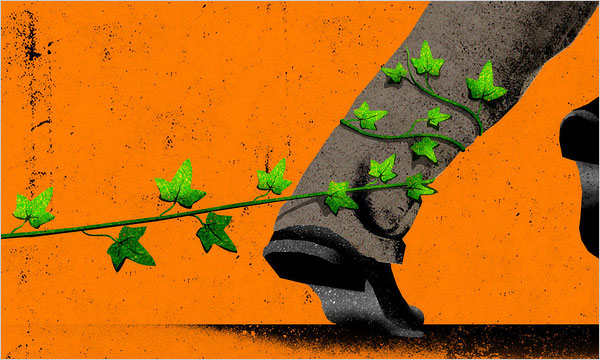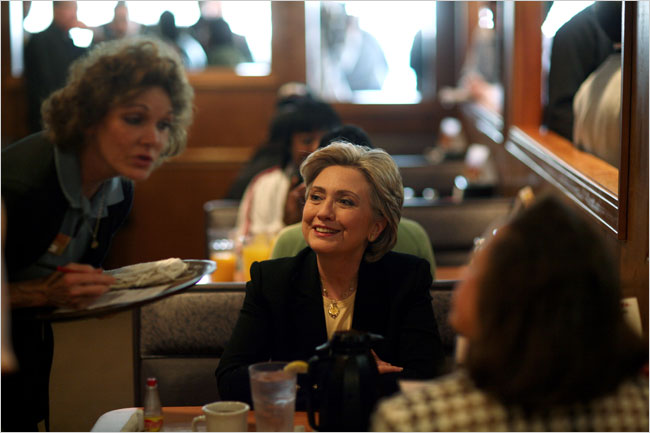| Want to send this page or a link to a friend? Click on mail at the top of this window. |
| More Books and Artsl |
| Posted May 28, 2008 |
| CLASS OF O8 | |
| The Snare of Privilege | |
 |
WASHINGTON — Hillary Rodham Clinton, Wellesley ’69, Yale Law ’73 and the first lady of the land for eight years, is suddenly a working-class heroine of guns and whiskey shots. Barack Obama, Columbia ’83 and Harvard Law ’91, visits bowling alleys and beer halls and talks about his single mother who lived on food stamps.
John S. McCain III, United States Naval Academy ’58, the son and grandson of admirals and the husband of one of the richer women in Arizona, chases after the conservative, anti-elite religious base of the Republican Party, and prefers to talk about the “cabin” at his Sedona weekend retreat rather than the Phoenix home lushly featured in the pages of Architectural Digest in 2005.
In an increasingly populist country, it’s not surprising that all three presidential contenders have been sprinting away from the elitist label for much of this primary season. But do they really expect to get away with it?
 |
TODD HEISLER/THE NEW YORK TIMES |
| REGULAR GAL Wellesley and Yale credentials aside, Hillary Rodham Clinton has pretty much avoided the "elitist" label. |
More to the point, should they? Don’t voters want the best and brightest, and best-credentialed, rising to the top?
Not exactly. Americans have been ambivalent about elites since the nation was founded by revolutionaries who were also, in many cases, landed gentry. And status and wealth still play an outsize role in our supposedly classless society.
Our presidential history is a case in point. Although there has long been an anti-aristocratic bent to American politics, voters have put some famous aristocrats (including two Roosevelts, one Kennedy, all Harvard men) into the White House, and have all but idolized them as well. Over the last 20 years, every president has been a graduate of Yale. In 2004, two members of the university’s rarefied secret society, Skull and Bones, ran against each other, and the more elite candidate, George W. Bush (Andover, Yale, Harvard Business School, son of a president), won.
But it’s not always easy to say exactly who, or what, constitutes the elite — especially in recent decades. In his book “The Power Elite,” published in 1956, the leftist thinker C. Wright Mills identified a class “composed of political, economic, and military men,” who harnessed “the major means of production” along with “the newly enlarged means of violence” created in the nuclear age. In 1975, the neoconservative Irving Kristol described the elite, or “the new class,” as he termed it, as a confederacy of like-minded liberals in a range of professions — from journalism to law — who were “suspicious of, and hostile to, the market precisely because the market is so vulgarly democratic.”
Mr. Mills and Mr. Kristol shared the belief that “the elite,” however they were defined, wielded disproportionate influence. This year, these competing views remain in place. Republicans sneer at Democrats for being cultural elitists, and Democrats deride Republicans as economic elitists. But the old labels have been turned inside out.
Mrs. Clinton and Mr. McCain have both derided Mr. Obama as “elitist” for his remarks about bitter rural voters who “cling” to guns and religion, even as Mr. Obama, in a counterpunch, mocked her courtship of gun owners, depicting her as a kind of ersatz Annie Oakley “packing a six-shooter” in a duck blind. And Mr. McCain, throwing a haymaker of his own, pointed out in a recent speech to members of the National Rifle Association that “someone should tell Senator Obama that ducks are usually hunted with shotguns.”
Amid all this, some have noted that we have reached a curious moment in American history: an African-American candidate, born seven years after the Supreme Court repudiated segregation in public schools and four years before the Voting Rights Act was passed, finds himself struggling to overcome an aura of privilege.
“It really is a delicious irony that the first serious black candidate for president should suddenly be described as elite,” said Tom Wolfe, the author of “Bonfire of the Vanities” and a longtime chronicler of the nation’s fixation on status.
One reason is that Mr. Obama holds two Ivy League degrees at a time when not all Americans accept the notion of an Ivy League education as a triumph of American opportunity. As elite campuses have become more culturally diverse, but not necessarily more accessible to many in the middle class, the perception persists that high-powered connections still matter.
“Most people in America just don’t buy into the idea of a meritocracy as defined by Ivy League meritocrats,” said Nicholas Lemann, the dean of Columbia University’s Graduate School of Journalism and the author of “The Big Test,” a history of the SAT and the rise of the American meritocracy. “That’s one reason why the average American buys the person who doesn’t have fancy college credentials but who built a business from scratch, like the guy who owns a Toyota dealership in Marietta, Ga., and who grew up poor.”
In a nation without a titled aristocracy, an elite education may well be the most important membership card. “American elites have a problem that the Europeans don’t, which is how to assure that their children and their children’s children retain their elevated social position,” said Jason Kaufman, a Harvard sociologist who has written on elites and American culture. “Americans do this through cultural institutions and exclusion — art museums, classical music and tremendously elitist universities.”
There may be another reason Americans are skeptical about the idea that the best rise to the top: those at the top haven’t performed too well lately. Christopher Buckley, Yale ’75, the novelist and humorist, notes that recent Iraq books contain echoes of “The Best and the Brightest,” David Halberstam’s classic account of the huge failures of the Ivy League brain trust in the Kennedy White House who propelled the nation into Vietnam. “If you loved Vietnam, brought to you by Harvard and Yale, you’ll love Iraq,” Mr. Buckley said.
Consider some crucial players in the Iraq war: former Defense Secretary Donald H. Rumsfeld, Princeton ’54; Vice President Dick Cheney, Yale dropout; I. Lewis Libby, Yale ’72; and L. Paul Bremer III, the former top American civilian administrator in Baghdad, Yale ’63, Harvard Business ’66. Mr. Bush, Mr. Bremer and Mr. Libby also graduated from Andover.
Mr. Buckley recalled a famous line uttered by his father, William F. Buckley Jr., Yale ’50, who observed in the 1960s that he’d rather “be governed by the first 2,000 names in the Boston telephone book than by the 2,000 members of the Harvard faculty.”
Ivy League credentials aside, what matters in the end to most voters, when it comes to choosing a president, is not academic pedigree, but rather the candidates’ ability to make an emotional connection and to win trust and confidence. The most famous aristocrat-presidents of the 20th century, John F. Kennedy and Theodore and Franklin Delano Roosevelt, all had that gift, and it outweighed the advantages — and drawbacks — of education, wealth and privilege.
This year’s focus on the crucial swing states, and their large working-class populations, has made inspiring those voters and playing down elitist credentials a political necessity. At the very least, Mrs. Clinton’s lopsided primary victories in West Virginia and Kentucky show how much more work Mr. Obama, the likely Democratic nominee, must do with this critical slice of the electorate.
“We believe in the best and the brightest, but you’ve also got to relate to ordinary people,” said Ed Rollins, the longtime Republican strategist who was the national chairman this year of the unsuccessful presidential campaign of former Gov. Mike Huckabee of Arkansas. “I think one of the problems that Obama has is that he gives a magnificent speech, he can inspire massive crowds, but he seems aloof up close.”
The lesson has not been lost on Mr. McCain, whose third-generation Annapolis lineage makes him perhaps the most elite of the three candidates and is married to a woman whose money financed his political career. In a speech last month in Inez, Ky., the Appalachian coal-mining hollow where in 1964 Lyndon B. Johnson declared his war on poverty, Mr. McCain tried to bridge the difference.
“I cannot claim that the circumstances of our lives are similar in every respect,” Mr. McCain told a friendly crowd at the Martin County Courthouse. “I’m not the son of a coal miner. I wasn’t raised by a family that made its living from the land or toiled in a mill or worked in the local schools or health clinic. I was raised in the United States Navy, and after my own naval career, I became a politician. My work isn’t as hard as yours.”
Nonetheless, Mr. McCain assured the crowd that “you are my compatriots,” and “that means more to me than almost any other association.”
It was a peculiarly American sentiment — hopeful, political, perhaps na´ve. But it was as old as the nation itself. “I am a living witness that any one of your children may look to come here as my father’s child has,” Lincoln told Union troops assembled at the White House in August 1864, as recounted in Doris Kearns Goodwin’s book, “Team of Rivals.” He promised them all “equal privileges in the race of life.”
Copyright 2008 The New York Times Company. Reprinted from The New York Times, Week in Review, of Sunday, May 25, 2008.
| Wehaitians.com, the scholarly journal of democracy and human rights |
| More from wehaitians.com |